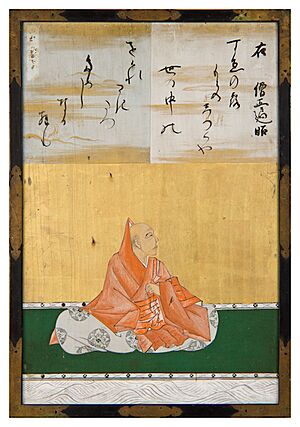Henjō facts for kids
Yoshimine no Munesada (良岑宗貞), also known as Henjō (遍昭 or 遍照), was a famous Japanese poet and a Buddhist priest. He lived from 816 to 890. Henjō is known as one of the six most important waka poets. He is also one of the thirty-six "immortals of poetry." His poems are still studied today.
Contents
About Henjō
Munesada was the eighth son of Yoshimine no Yasuyo. His father was a high-ranking official called a Dainagon. Yasuyo was also a son of Emperor Kanmu, but he was not in line to become emperor.
His Early Life
Munesada started his career working for the Japanese court. This means he worked for the Emperor and his government. He became a kurōdo, a special assistant to Emperor Ninmyō. In 849, he was promoted to be the Head of the Kurōdo.
Becoming a Monk
When Emperor Ninmyō died in 850, Munesada was very sad. Because of his grief, he decided to become a monk. He took the religious name Henjō. This name means "Universally Illuminated." He joined the Tendai school of Buddhism.
Building Temples
Even as a monk, Henjō stayed involved in important matters. In 877, he built a temple called Gangyō-ji in Yamashina, near Kyoto. He also managed another temple called Urin-in in northern Kyoto, which he received in 869. In 885, he became a very high-ranking priest. People then called him Kazan Sōjō.
His Family and Friends
Henjō's son, Sosei, also became a waka poet and a monk. Henjō was known to have discussions with other famous poets. One famous poet, Ki no Tsurayuki, once said that Henjō's poems were well-made but sometimes lacked deep feeling. He compared them to a beautiful picture that doesn't quite touch your heart.
Henjō's Poetry
Henjō wrote many poems. Thirty-five of his waka poems were chosen for important collections. These include the famous Kokin Wakashū.
A Famous Poem
One of Henjō's most famous poems is from the Hyakunin Isshu collection. It is a beautiful poem about heavenly dancers:
天つ風雲の通ひ路吹き閉ぢよ
をとめの姿しばしとどめむ
ama tsu kaze kumo no kayoiji fuki-toji yo
otome no sugata shibashi todomen
Breezes of Heaven, blow closed the pathway through the clouds to keep a little longer these heavenly dancers from returning home.
(Kokin Wakashū 17:872)
This poem asks the wind to close the path in the sky. He wants to keep the beautiful heavenly dancers on Earth for a little longer. It shows his love for beauty and his wish for special moments to last.
 | Madam C. J. Walker |
 | Janet Emerson Bashen |
 | Annie Turnbo Malone |
 | Maggie L. Walker |


